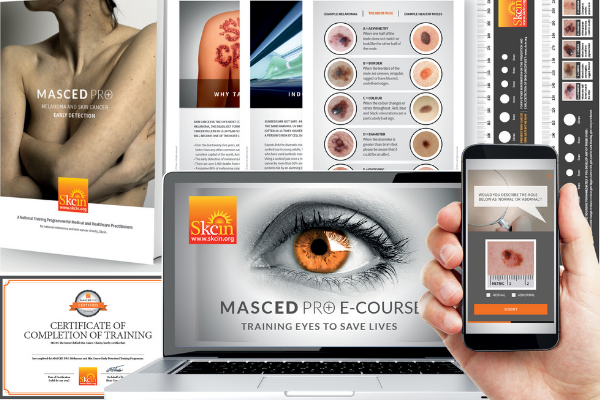May is national skin cancer awareness month

Our charity partner, Skcin, highlights skin cancer as a major public health concern, the importance of prevention and early detection, and how podiatrists are well placed to help combat rising statistics and save lives
One in every three cancers diagnosed is skin cancer. It’s the most common and fastest rising cancer in the UK, with one in four males, and one in five females, diagnosed with non-melanoma skin cancer; and one in 36 males, and one in 47 females, diagnosed with melanoma (the most serious, life-threatening form of the disease).
Statistics are compelling, yet 90% of cases are caused by over-exposure to ultraviolet radiation (UVR), making the disease largely preventable.
How can we reduce our risk of skin cancer?
Skin cancer can be avoided by adopting a series of simple sun-safe strategies. Start by checking the UV index - when UV levels reach three or above, the following ‘Five S’ approach to sun protection should be used in combination:
- Slip-on clothing
Clothing should be considered the first line of defence against UVR and should cover as much skin as possible - Slop on sunscreen
Apply sunscreen liberally and evenly to all areas of exposed skin 20 minutes before heading outdoors. Skcin recommend using a minimum SPF 30 with four or five star UVA protection.
Always reapply sunscreen at least every two hours, more often if perspiring and always straight after swimming - Slap on a wide brimmed hat
A wide brimmed hat will provide protection to the scalp and help shade the face, neck, ears, cheeks and eyes - Slide on quality sunglasses
Opt for sunglasses labelled with a CE UV400+ rating to protect the eyes which are up to 10 times more sensitive to UV damage than our skin - Shade from the sun
Seek shade from the sun whenever possible, particularly during peek UV hours, between 11.00am and 3.00pm in the UK.
The importance of early detection
Skin cancer is unique in that we can physically see it developing in its early stages. However, ignorance regarding how to spot the early signs and symptoms remains widespread among individuals and more concerningly across professional capacities - even GPs have little to no training, resulting in misdiagnosis and poor prognosis for patients.
Skin cancer seldom hurts and is much more frequently seen than felt, but if detected, diagnosed and treated early, almost all skin cancers, including melanoma, are treatable or curable.
Top tips in skin surveillance
Checking our skin regularly and thoroughly is vital. Here’s our top tips to support you in becoming savvy with skin surveillance:
- Conduct a full-body self examination once a month, every month - it’s simply the smartest way to get to know your skin and build confidence in identifying changes that could indicate the early warning signs
- Check your entire skin, from the top of your head, to the soles of your feet, including your scalp, behind your ears, under breasts, the genitalia and your nails. If possible, get someone to help you check the back of your body / hard to see areas
- Get savvy on skin cancer by learning how to identify suspicious lesions and always see your GP or dermatologist with anything new, unusual or changing.
Extending your knowledge - the role of a podiatrist
With many benign lesions being common on the foot, identifying a rare occurrence of melanoma amongst them can be challenging. This contributes significantly to delayed diagnosis, with malignant lesions often undetected for longer periods, resulting in poor prognosis for patients.
Podiatrists are therefore well placed to aid in the early detection of cancerous lesions and can up-skill by completing the MASCED PRO training programme, developed by our charity partner Skcin, reviewed and supported by the British Association of Dermatologists and accredited by the Royal College of Podiatry.
The programme provides medical and healthcare practitioners with an accessible, cost effective tool with which to develop their knowledge of the early signs and symptoms of melanoma and non-melanoma skin cancers, giving them the confidence to refer or signpost patients to appropriate colleagues or services following the identification of suspicious lesions.
The MASCED PRO training programme is an online course backed up with professional printed resources to support professionals in clinic, enabling practitioners to integrate this knowledge into their everyday practice and extend vital information on prevention and early detection across their patient communities.
To date, over 10,000 hair, beauty and healthcare professionals have become accredited, with many lives saved as a result of the training.
To join Skcin’s growing army of professionals on a mission to combat skin cancer and save lives, sign up for the MASCED PRO training at: MASCED.UK
Discount for RCPod members or MASCED PRO training
To help raise awareness of skin cancer all year round, RCPod members can take advantage of a 20% discount code for the Masced Pro training until 31 May 2022. Use code RCPod to access the training for only £32.
